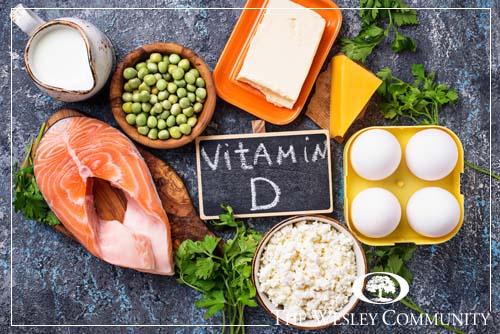Learn more about vitamin D in this helpful article for seniors. From risk factors to medical conditions linked to a deficiency, here’s what to know.

For years the role vitamin D played in aging well wasn’t fully understood. Experts recognized it was vital for healthy bones and fall prevention, but weren’t certain how it impacted health beyond that. We now know that vitamin D impacts wellness in many more ways. From sleep problems to cancer, you put your health at risk if you have a vitamin D deficiency.
Knowing what the risk factors are and how to prevent them is vital at every age.
Health Concerns Linked to Vitamin D Deficiency
A few of the most common medical conditions that may be caused by or linked to a vitamin D deficiency include:
- Frequent bone fractures
- Type 2 diabetes
- Deep muscle pain that causes muscle weakness and fatigue
- Confusion, memory problems, and forgetfulness
- Cardiac problems, such as heart disease or stroke
- Greater rates of Multiple sclerosis
- Higher incidences of breast, thyroid, lung, colorectal, and prostate cancers
6 Signs of Vitamin D Deficiency
A vitamin D deficiency isn’t easy to recognize in yourself or a senior loved one. The symptoms can be easily mistaken for another health condition like dementia or an autoimmune disease.
A few of the more common signs of a vitamin D deficiency:
- Fatigue that doesn’t improve with a good night’s sleep
- Joint pain and stiffness, sometimes accompanied by swelling
- Overall feeling of weakness in limbs and a lack of energy
- Experiencing a persistent case of the blues
- Feeling sweaty, cold, or clammy
- Easily confused or having trouble concentrating
Diagnosing and Treating Vitamin D Deficiency
If you and your senior loved one spend the majority of your time indoors away from the vitamin D producing rays of the sun, it may be a good idea to schedule an appointment with your primary care physician. They can order a simple blood test to determine if is a problem.
Should you or your family member be found to have a vitamin D deficiency, the treatment is usually fairly simple. Depending on the level of the deficit, the physician will likely order either a prescription dose of vitamin D or an over-the-counter supplement and dosage.
While it may help to increase the amount of vitamin D you consume, it may not be enough. Not many foods contain enough of this essential vitamin to make up a deficiency. Foods that contain vitamin D include:
- Cow’s milk
- Almond milk
- Greek yogurt
- Egg yolks
- Cottage cheese
- Beef or calf liver
- Sardines
- Canned tuna
- Wild-caught fish, especially salmon and mackerel
- Mushrooms
Some foods are enriched with vitamin D during the production process. Orange juice, cereal, and some dairy products.
It’s also important to incorporate foods high in calcium in to your diet. Calcium helps the body better absorb vitamin D. A few food choices to try eating more of are:
- Cheese
- Vanilla ice cream
- Nuts
- Spinach
- Tofu
- Navy beans
- Green beans
- Canned salmon
- Peas
- Figs
- Oranges
Nutritious Meals at The Wesley
It’s common for seniors with chronic health conditions to struggle with menu planning and meal preparation. If the older adult in your life is one, The Wesley has solutions to consider. Hiring an in-home caregiver to assist with meals or by moving to our assisted living community, Woodlawn Commons, are two to explore.

